- Home
- David McCullough
1776 Page 2
1776 Read online
Page 2
Like the Parliament, he had acted thus far in a spirit of moderation, he said, and he was “anxious to prevent, if it had been possible, the effusion of the blood of my subjects, and the calamities which are inseparable from a state of war.” He hoped his people in America would see the light, and recognize “that to be a subject of Great Britain, with all its consequences, is to be the freest member of any civil society in the known world.”
Then came a new charge, based on opinions received from his commander at Boston. There must be no more misconceptions about the true intent of those deceiving the unhappy people of America. “The rebellious war…is manifestly carried on for the purpose of establishing an independent empire.”
I need not dwell upon the fatal effects of the success of such a plan. The object is too important, the spirit of the British nation too high, the resources with which God hath blessed her too numerous, to give up so many colonies which she has planted with great industry, nursed with great tenderness, encouraged with many commercial advantages, and protected and defended at much expense of blood and treasure.
Since, clearly, it was the better part of wisdom “to put a speedy end” to such disorders, he was increasing both his naval and land forces. Further, he was pleased to inform the Parliament, he had received “friendly offers of foreign assistance.”
“When the unhappy and deluded multitude, against whom this force will be directed, shall become sensible of their error, I shall be ready to receive the misled with tenderness and mercy,” he pledged, and as evidence of his good intentions, he would give authority to “certain persons” to grant pardons “upon the spot” in America, though beyond this he said no more.
In sum, he, George III, Sovereign of the Empire, had declared America in rebellion. He had confirmed that he was committing land and sea forces—as well as unnamed foreign mercenaries—sufficient to put an end to that rebellion, and he had denounced the leaders of the uprising for having American independence as their true objective, something those leaders themselves had not as yet openly declared.
“Among the many unavoidable ill consequences of this rebellion,” he said at the last, “none affects me more sensibly than the extraordinary burden which it must create to my faithful subjects.”
His Majesty’s appearance before Parliament had lasted just twenty minutes, after which, as reported, he returned to St. James’s Palace “as peaceably as he went.”
***
THE MEMBERS of the House of Commons filed out directly to their own chamber, and debate on the King’s address commenced “brisk and warm” in both houses, the opposition marshaling the case for conciliation with extraordinary force.
In the House of Lords, expressions of support were spirited though comparatively brief. The King was praised for his resolution to uphold the interests and honor of the kingdom, praised for his decisiveness. “We will support your majesty with our lives and fortunes,” vowed Viscount Townsend.
Those in opposition had more to say, and spoke at times with pronounced emotion. The measures recommended from the throne, warned the Marquis of Rockingham, were “big with the most portentous and ruinous consequences.” The hiring of foreign troops was an “alarming and dangerous expedient.” Even more deplorable was the prospect of “shedding British blood by British hands.” Any notion of conquering America was “wild and extravagant,” said the Earl of Coventry. The administration was “no longer to be trusted,” said Lord Lyttleton bitterly.
“How comes it that the colonies are charged with planning independency?” the Earl of Shelburne demanded to know. “Who is it that presumes to put an assertion (what shall I call it, my Lords?) contrary to fact, contrary to evidence?…Is it their intention, by thus perpetually sounding independence in the ears of the Americans, to lead them to it?”
As the afternoon light began to fade and the chamber grew dim, the candles of the chandeliers were lit.
The one surprise, as the debate continued, was a vehement speech by the Duke of Grafton, Augustus Henry Fitzroy, former Prime Minister, who had not previously opposed the administration. Until now, he said, he had concurred in the belief that the more forceful the government in dealing with the Americans, the more likely matters could be “amicably adjusted.” But he had been misled, deceived. Admitting to his ignorance of the real state of things in America—and inferring that this was no uncommon handicap in Parliament—he boldly proposed the repeal of every act concerning America since the incendiary Stamp Act of 1765.
This, I will venture to assert, will answer every end; and nothing less will accomplish any effectual purpose, without scenes of ruin and destruction, which I cannot think on without the utmost grief and horror.
The Earl of Dartmouth, Secretary of State for the Colonies, was astonished. How could any noble lord possibly condemn the policies of the administration, or withdraw support, without at least giving them a fair trial?
***
IT WAS IN THE COMMONS that the longer, more turbulent conflict ensued. Of the twenty or so who rose to speak, few held back. Attacks on the King, Lord North, the Foreign Ministry in general, and on one another at times brought the heat of debate to the boiling point. There were insults exchanged that would long fester, bombast and hyperbole in abundance, and moments when eloquence was brought to bear with a dramatic effect remarkable even in the Commons.
It was Parliament as theater, and gripping, even if the outcome, like much of theater, was understood all along. For importantly it was also well understood, and deeply felt, that the historic chamber was again the setting for history, that issues of the utmost consequence, truly the fate of nations, were at stake.
The passion of opposing opinion was evident at once, as the youthful John Dyke Acland of Devonshire declared emphatic support of the King’s address. True it was that the task of “reducing America to a just obedience” should not be underestimated, he said, but where “the interests of a great people” were concerned, “difficulties must be overcome, not yielded to.”
Acland, a headstrong young army officer, was ready to serve in America himself (and would), and thus what he said had unusual force, if not perfect historic validity. “Recollect the strength, the resources, and above all the spirit of the British nation, which when roused knows no opposition.”
Let me remind you of those extensive and successful wars that this country has carried on before the continent of America was known. Let me turn your attention to that period when you defended this very people from the attacks of the most powerful and valiant nation in Europe [France], when your armies gave law, and your fleets rode triumphant on every coast. Shall we be told then that this people [the Americans], whose greatness is the work of our hands, and whose insolence arises from our divisions, who have mistaken the lenity of this country for its weakness, and the reluctance to punish, for a want of power to vindicate the violated rights of British subjects—shall we be told that such a people can resist the powerful efforts of this nation?
At about the time the chandeliers were being lighted in the House, John Wilkes, Lord Mayor of London, champion of the people and the homeliest man in Parliament, stood to be heard, and to let there be no doubt that he was John Wilkes.
“I speak, Sir, as a firm friend to England and America, but still more to universal liberty and the rights of all mankind. I trust no part of the subjects of this vast empire will ever submit to be slaves.” Never had England been engaged in a contest of such import to her own best interests and possessions, Wilkes said.
We are fighting for the subjection, the unconditional submission of a country infinitely more extended than our own, of which every day increases the wealth, the natural strength, the population. Should we not succeed…we shall be considered as their most implacable enemies, an eternal separation will follow, and the grandeur of the British empire pass away.
The war with “our brethren” in America was “unjust…fatal and ruinous to our country,” he declared.
There was no longer
any question whether the Americans would fight, conceded Tory Adam Ferguson, but could anyone doubt the strength of Great Britain to “reduce” them? And this, he said, must be done quickly and decisively, as an act of humanity. Half measures would not do. Half measures could lead only to the horrors of civil war.
In response, George Johnstone, a dashing figure who had once served as governor of West Florida, delivered one of the longest, most vehement declamations of the night, exclaiming, “Every Machiavellian policy is now to be vindicated towards the people of America.”
Men are to be brought to this black business hood-winked. They are to be drawn in by degrees, until they cannot retreat…. we are breaking through all those sacred maxims of our forefathers, and giving the alarm to every wise man on the continent of America, that all his rights depend on the will of men whose corruptions are notorious, who regard him as an enemy, and who have no interest in his prosperity.
Johnstone praised the people of New England for their courage and fortitude. There was a wide difference, he said, between the English officer or soldier who merely did his duty, and those of the New England army, where every man was thinking of what further service he could perform. No one who loved “the glorious spirit of freedom” could not be moved by the spectacle of Bunker Hill, where “an irregular peasantry” had so bravely faced “the gallant Howe” leading the finest troops in the world. “Who is there that can dismiss all doubts on the justice of a cause which can inspire such conscious rectitude?”
Alexander Wedderburn, the Solicitor General, belittled the very idea of standing in the way of the King and called for the full-scale conquest of America. “Why then do we hesitate?” he asked.
Because an inconsiderable party, inconsistent in their own policies, and always hostile to all government but their own, endeavor to obstruct our measures, and clog the wheels of government? Let us rather second the indignant voice of the nation, which presses in from all quarters upon the Sovereign, calling loudly for vigorous measures…. Sir, we have been too long deaf. We have too long shown our forbearance and long-suffering…. Our thunders must go forth. America must be conquered.
As the night wore on, Lord North, the stout, round-shouldered Prime Minister, remained conspicuously silent in his front-bench seat, his large, nearsighted eyes and full cheeks giving him the look, as the wit Horace Walpole said, of a blind trumpeter. North was much liked—moderate, urbane, and intelligent. He had made his career in the Commons and, with his affable manner, had acquired few if any enemies among his political opponents. When attacked, he took no offense. He could be a markedly persuasive speaker but was equally capable, when need be, of remaining silent, even napping a bit.
From years of experience North had also learned to count votes in advance, and he knew now, as did nearly everyone present, that the decided majority of the Commons, like the people at large, stood behind the King.
Perhaps the most telling moment of the whole heated session came near midnight, when another army officer, but of an older generation than John Dyke Acland, rose to speak. Colonel Isaac Barré was a veteran of the French and Indian War who had come home from the Battle of Quebec badly disfigured. He had been hit in the head by a musket ball that blinded him in one eye and left his face twisted into a permanent sneer. Further, it had been Isaac Barré, in a past speech in defense of the Americans, who had first called them “Sons of Liberty,” and the name had taken hold.
He had lost one eye, the colonel reminded his listeners, but the one good “military eye” he had left did not deceive him. The only way to avert “this American storm” was to reach an accommodation just as soon as possible.
***
BETWEEN THEM, Edmund Burke and young Charles James Fox filled the next several hours. Burke, in customary fashion, took his time. Nearly all that he said, he and others had said before, but he saw no harm in repetition, or any need for hurry. He held the floor for nearly two hours, a large part of his speech devoted to the disgrace of British forces cooped up in Boston by those said to be an undisciplined rabble.
There were no ringing lines from Burke this time, little at all for the newspapers to quote. Possibly he did not wish to outshine Fox, his protégé, who spoke next and who, at twenty-six, was already a dazzling political star.
Born to wealth and position, Fox was an unabashed fop, a dandified “macaroni,” who at times appeared in high-heeled shoes, each of a different color, and happily spent most nights drinking or gambling away his father’s fortune at London’s best clubs. But his intellect and oratorical gifts were second to none. He always spoke spontaneously, never from notes or a prepared text. Fox, it would be observed, would as soon write down what he was going to say as pay a bill before it came due.
He attacked immediately and in searing fashion, calling Lord North the “blundering pilot” who had brought the nation to a terrible impasse. If Edmund Burke had failed to provide a memorable line for the night’s efforts, Fox did at once:
Lord Chatham, the King of Prussia, nay, Alexander the Great, never gained more in one campaign than the noble lord has lost—he has lost a whole continent.
It was time for a change in the administration, time for new policies. The present ministers were enemies of freedom.
I cannot consent to the bloody consequences of so silly a contest about so silly an object, conducted in the silliest manner that history or observation has ever furnished an instance of, and from which we are likely to derive nothing but poverty, disgrace, defeat, and ruin.
Once Fox finished, North stood at his place and calmly allowed he had no wish to remain a day in office were he to be judged inactive, inattentive, or inconsiderate.
North was not a man enamored with war. He had nothing of the look or temperament of a war leader. Privately he was not at all sure it would be possible to vanquish the Americans, and he worried about the cost. To General Burgoyne he had written, “I would abandon the contest were I not most intimately convinced in my own conscience that our cause is just and important.” George III relied on him, calling him “my sheet anchor,” and it was, and would remain, North’s role to explain and defend the King and administration policies and decisions before the Commons.
The intention now, he affirmed, was to send a powerful sea and land force across the Atlantic. But with these forces would also go “offers of mercy upon a proper submission.” How “proper submission” was to be determined, or who was to bear such offers, he did not say. As time would show, however, the real purpose of such peace gestures was to speed up an American surrender.
“This will show we are in earnest, that we are prepared to punish, but are nevertheless ready to forgive. This is, in my opinion, the most likely means of producing an honorable reconciliation.”
On that note the debate ended.
In the House of Lords, where work had wound up at midnight, the opposition to the King’s address, and thus to all-out war in America, was defeated by a vote of more than two to one, 69 to 29.
In the House of Commons, their impassioned speeches notwithstanding, the opposition was defeated by an even greater margin, 278 to 108.
By the time the vote in the Commons had concluded, it was four in the morning.
***
ONE OF THOSE MEMBERS of the House of Commons who had refrained from speaking, and who felt extremely pleased with the outcome, was the gentleman-scholar Edward Gibbon. A supporter of Lord North, Gibbon never spoke on any issue. But in private correspondence from his London home, he had been assuring friends that “some[thing] will be done” about America. The power of the empire would be “exerted to the utmost,” he wrote. “Irish papists, Hanoverians, Canadians, Indians, etc. will all in various shapes be employed.”
Gibbon, who was then putting the final touches to the first volume of his masterpiece, History of the Decline and Fall of the Roman Empire, now felt even more confident about the course of history in his own time. “The conquest of America is a great work,” he wrote.
Soon after, in early November, King George III appointed a new Secretary for the American colonies, Lord George Germain, a choice that left little doubt, if any remained, that the King, too, considered the conquest of America serious work to which he was seriously committed.
Germain was to replace the Earl of Dartmouth, whose attitude toward the war seemed at times less than wholehearted. He was a proud, intelligent, exceedingly serious man of sixty, tall, physically impressive, and, notably unlike the King and Lord North, he was a soldier. He had served in the Seven Years’ War in Germany and with good reputation, until the Battle of Minden, when, during a cavalry attack, he was accused of being slow to obey orders. He was not charged with cowardice, as his critics liked to say. At a court-martial called at his own insistence, he was found guilty only of disobedience. But his military career ended when the court declared him unfit for further service.

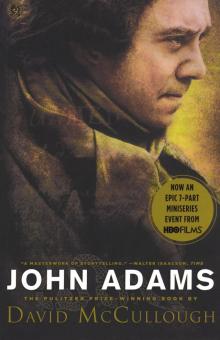 John Adams
John Adams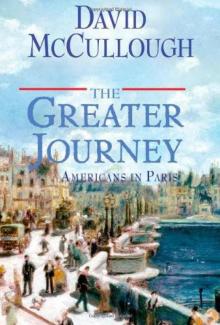 The Greater Journey: Americans in Paris
The Greater Journey: Americans in Paris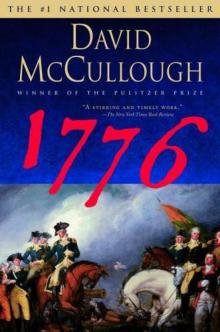 1776
1776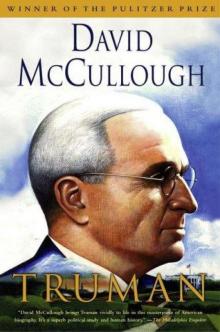 Truman
Truman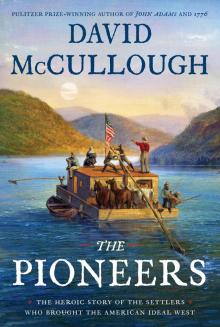 The Pioneers
The Pioneers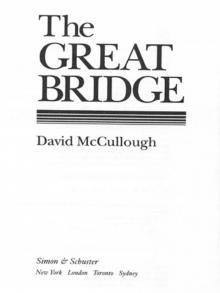 The Great Bridge: The Epic Story of the Building of the Brooklyn Bridge
The Great Bridge: The Epic Story of the Building of the Brooklyn Bridge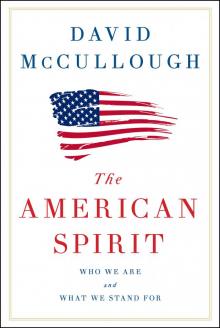 The American Spirit
The American Spirit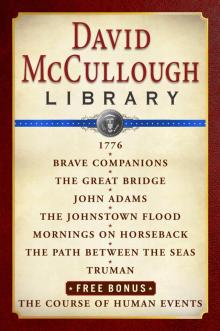 David McCullough Library E-book Box Set
David McCullough Library E-book Box Set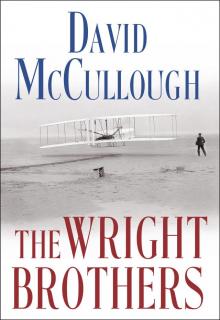 The Wright Brothers
The Wright Brothers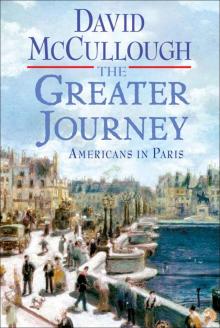 The Greater Journey
The Greater Journey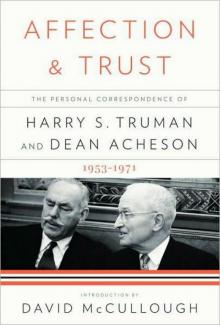 Affection and Trust: The Personal Correspondence of Harry S. Truman and Dean Acheson, 1953-1971
Affection and Trust: The Personal Correspondence of Harry S. Truman and Dean Acheson, 1953-1971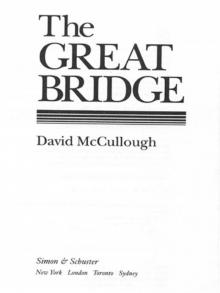 The Great Bridge
The Great Bridge